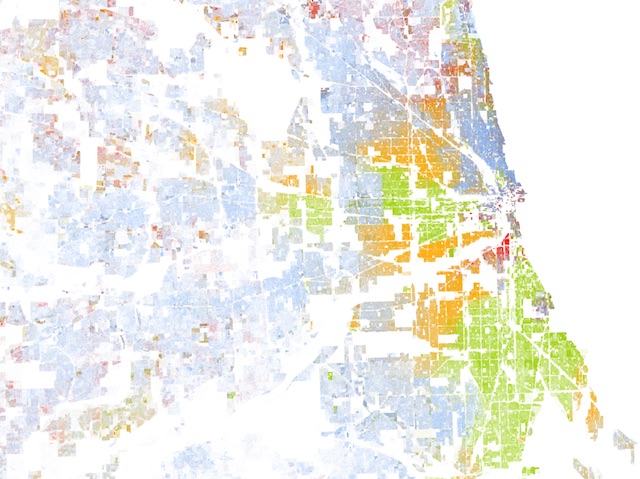Chicago Is No Longer The Most Segregated City In The Country
By Mae Rice in News on Jan 4, 2016 10:45PM

Chicago circa 2010, with each dot representing each person, color-coded by race and ethnicity (via Racial Dot Map)
Back in 2010, Chicago was the country’s most segregated city—but times are changing, very slightly! This year, it’s the country’s third most segregated city, a Brookings Institution analyst told the Tribune.
Milwaukee is now the most segregated city in the U.S., and New York came in second most segregated, according to William Frey, the demographer who analyzed the latest census data from the American Community Survey for Brookings.
If you want to get into the nitty gritty, the Tribune broke it down by the numbers:
Most people here live in neighborhoods that have a little more diversity [than] they did a decade ago, according to Frey's research, which looks at the Chicago region along with some outlying suburbs.For example, the average white resident in the Chicago area now lives in a neighborhood that is 71.5 percent white. That figure is down from nearly 79 percent in 2000 because there are more Asians, blacks and Hispanics living in those communities, Frey's report shows.
In much the same way, the average black resident here now lives in a neighborhood that is 64 percent black. That figure is down from 72 percent in 2000, because more whites, Asians and Hispanics have moved into those communities.
Another demographer, Rob Paral, told the Tribune that neighborhoods like the South Loop and Cabrini Green are key sites of desegregation—as are the suburbs, where many African-Americans are moving in search of better opportunities. (As a counterpoint, stats whiz Nate Silver, who spent a stint in Hyde Park, noted in May that often some of the most diverse cities end being the least racially integrated.)
Clearly, though, the city could stand to move even further from the old days of legal segregation and redlining. Segregation contributes to racial disparities in education, wealth, and employment, as the Tribune notes.